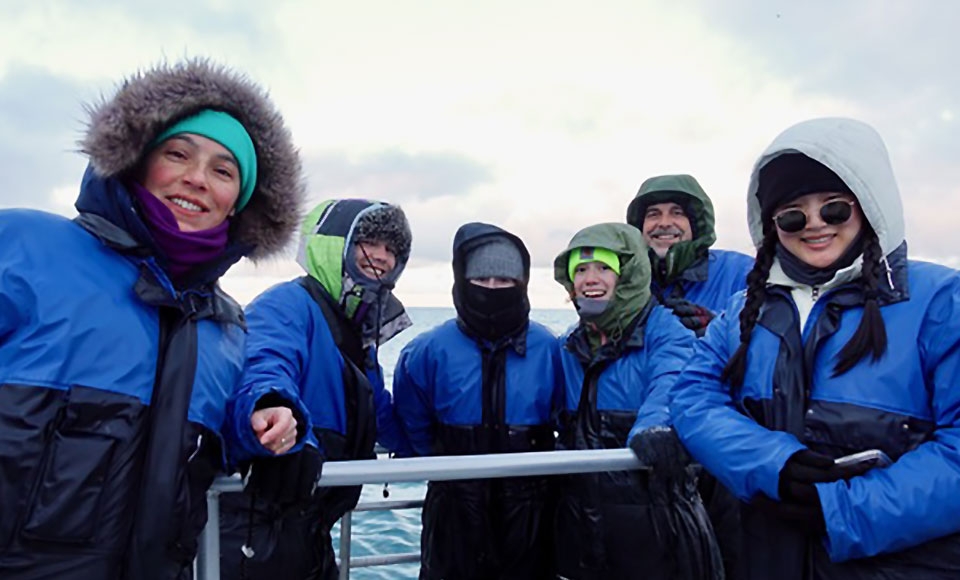Breadcrumbs
- News
- News Archive
- Adventures of Iceland Field Trip

It was early in the morning on March 11 — just before a group of students and faculty were ready to start the journey to Akureyri, the Capital of North Iceland — that biology professor Dr. Vania Coelho received urgent emails from Dominican’s President Mary B. Marcy and Global Education Office Director Kati Bell.
“The emails said that the United States was going to start restricting flights from Europe in the next few days, but we were assured that the University was already doing everything it could to make sure that we would be OK,” Coelho recalls.
When the group of 13 left from the Department of Natural Sciences and Mathematics in early March to study biodiversity and sustainability issues in Iceland, coronavirus was a slowly growing but still faraway concern.
“We really did not think it was an issue at the time; although, many of us believed that it could become an issue in a few months,” Dr. Coelho says.
When they arrived in Iceland, the Dominican group quickly embarked on a busy schedule touring natural sites and meeting with local experts. Each evening, when they arrived back at their hotel following dinner, they were too tired to tune into the news. The hotel’s spotty Internet also made online surfing all that much harder.
“We were so busy, visiting wonderful sites and hearing about how Iceland was tackling issues related to global climate change,” Coelho says. “Many of us really didn’t have time to go onto the internet to read the news – we were exhausted!”
From orca sightings to exploring ice caves located within glaciers, the group spent their days learning about the country’s beautiful, but harsh, landscape.
They also witnessed climate change in action when visiting Diamond Beach, a strip of black volcanic sand along the Jökulsárlón glacier lagoon on the South Coast of Iceland.
“We saw how the melting of the glacier creates small icebergs across the lagoon that connected out to the ocean,” Coelho recalls.
Many icebergs had washed up on the shore, creating a contrast with the black sand. “It was an out-of-this-world sight to see. Just amazing and stunning.”
Request Info On Undergraduate Programs
Political science major Julia Reinhard ’22 says visiting the glaciers helped her better understand the fragility of ecosystems in Iceland and around the world.
“Two of my favorite highlights were when we walked on the Mýrdalsjökull glacier and when we explored ice caves located on the Breiðamerkurjökull glacier,” Julia recalls. “These memories stand out to me because they were unique experiences that illuminated the need for bold climate change mitigation efforts to not only save Iceland’s glaciers, but to preserve fragile ecosystems around the globe.”
The visit to Iceland was a field trip component of a semester-long course, BIO 3505 International Field Biology, in which the students examine many issues facing Iceland, from local biodiversity threats, to problems with salmon farming, over-tourism and whale hunting, to name a few.
“Iceland is the perfect place to learn about important global events. They are tackling so many issues on a grand scale, from past deforestation and their difficulty in remediating this issue to the challenges they face preserving native species in an environment particularly sensitive to climate change.” Coelho says.
During their visits, the Dominican group stayed together and did observe self-protection — washing hands and using hand sanitizer (when they were not wearing heavy warm gloves, after all this was winter in Iceland). Everyone on the trip remained healthy and in good spirits.
The beautiful landscapes combined with the sighting of the northern lights were truly an extraordinary experience.
“Toward the end of our trip, when I received the emails from Dominican, I was able to tell all the students that we were going to be just fine — and that the University had our backs. Everyone remained calm, and no one panicked, as we knew we were in good hands.”
The return trip was largely uneventful. However, being met by officials in Seattle wearing hazmat suits was jarring.
“They were checking for people showing symptoms — fever or cough. Luckily, no one on our flight had a cough – that’s actually really unusual for this time of year!”
The group immediately went into isolation upon return, giving Coelho time to switch her in-person coursework to online delivery when the spring semester resumed on March 23.
“I just feel really fortunate and thankful that our group had such a marvelous learning experience and felt very supported by the university, knowing that Dominican really had stepped up to offer support.”